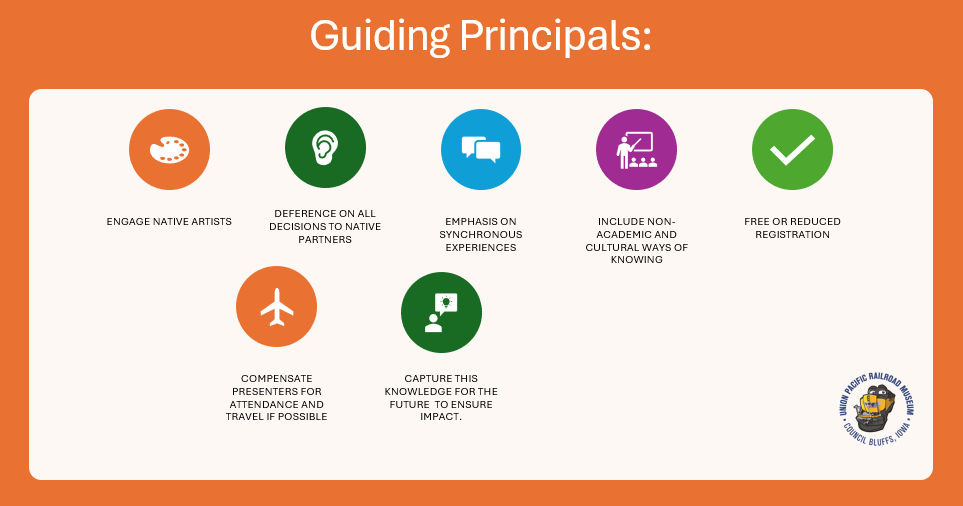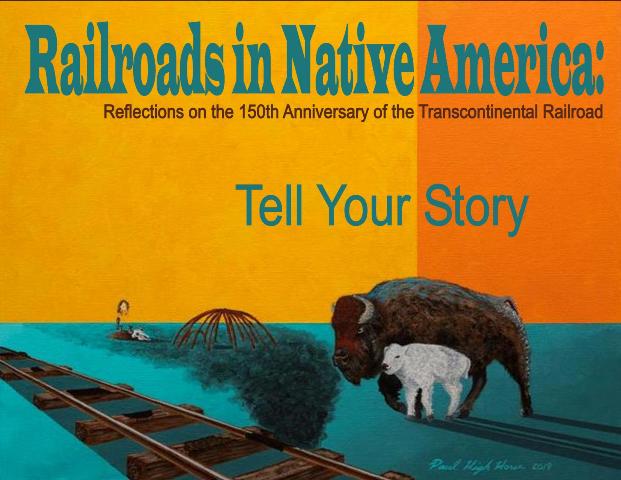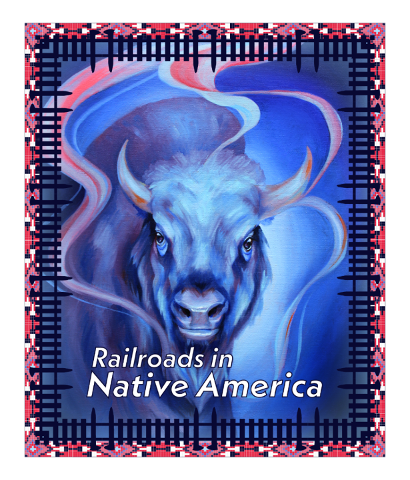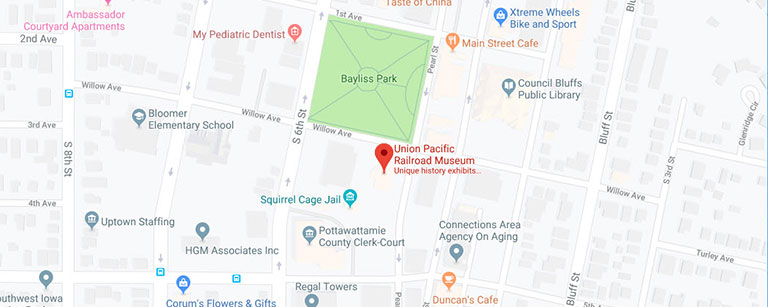Railroads in Native America: An Exploration of the Impact of Railroads in Indigenous Communities
Railroads in Native America is an ongoing exploration of the impact of railroads in Indian Country. The Gathering or Symposiums are intended to be a platform to expand the conversation on railroad history and to discuss the interrelationships and impacts between railroads and native people.
The initiative began in 2019 when discussions surrounding the 150th recognition of that event at Promontory Summit, Utah, focused more than anything else on the transformational benefits of the railroad to settlers.
Railroads in Native America Gatherings are led by these guiding questions:
- How/why did Native communities resist and/or participate in railroad expansion?
- In what ways have Native peoples—past and present—used the mobility and marketplace access provided by railroads to protect kin and community?
- How did railroads, their corporate backers, and the government contribute to the dispossession of Indigenous peoples?
- How have Indigenous homelands and cultures evolved in response to railroad expansion?
- What are the lasting impacts from railroad expansion to Tribal communities, lifeways, and ecosystems?

The Union Pacific Museum seeks out new partners for each gathering. We are honored to have worked with committees including Tribal Nations and community members across the Western United States.
Upcoming Gatherings
2026, Sacramento, CA: Railroads in Native America:
An Exploration of the Intersection of American Railroading and Indian Country

Portrait by Weshoyot Alvitre (Tongva)
This is a portrait of Modesta Avila, who was mixed race woman (Californio and CA Indian descent) and the first convicted Felony in Orange County, CA for protesting the building of the railway on her family’s property, land grant and surrounding tribal land. The piece is a large scale rendition of her official mug shot portrait from San Quentin prison, overlayed with the CA state flower: the poppy. The juxtaposition is to bring awareness that Native people have always been here, and continued to fight for their lands despite occupation and the history of land development and extraction. The railways contributed to colonization and westward expansion of Native Lands during the 1800s. Modesta Avila’s story shows a pinnacle of Mexican occupation, US occupation and complex relationships of Native peoples who survived both eras, who still fought for their land.
In the Spring of 2026, Sacramento — the ancestral homeland of the Nisenan, Southern Maidu, Valley and Plains Miwok, and Patwin Wintun — will host the third gathering of the Railroads in Native America symposium. This gathering started in 2019, as the nation was reflecting on the 150th Anniversary of the joining of the Central Pacific and Union Pacific railroad tracks at Promontory Summit, Utah. In recognition of the significant impact of railroading in Indian Country, this gathering seeks to provide a forum to discuss the diverse experiences of Native Americans through the lens of the development of railroads. The multi-day symposium brings together scholars, artists, musicians, tribal members, and representatives from tribal governments, in partnership with the National Park Service, the Union Pacific Railroad Museum, and the California State Railroad Museum and Foundation.
Want to collaborate? Get involved here or by emailing rrnativeamerica@gmail.com
We also welcome partnerships from non-tribal individuals and organizations. If you or an organization you represent wish to offer general financial assistance for the forum, or for presenters and/or attendees, please contact Karen Bradley Follette, the Director of Development for the California State Railroad Museum Foundation, at kfollette@csrmf.org.
Previous Gatherings
May 19-21, 2022 Railroads in Native America Gathering, Ogden UT
The 2022 Railroads in Native America Gathering and Symposium will be held on May 19-21, 2022 in Ogden, Utah at the Ogden Union Station. Utah’s official statewide railroad museum is located at the top of Ogden’s 25th Street Historic District.
This gathering will include a half day field trip on May 19th 2022 and opening reception that same evening. The gathering will be on May 20th and only a half day on May 21st at the Ogden Union Station Depot.
The Friday and Saturday Gathering is free of charge. The Thursday field-trip is $75 and covers transportation, food and guide honorariums.
This gathering is a mask friendly event and ask everyone to be sensitive to our guests and speakers.
September 12-15, 2019 Railroads in Native America, Omaha NE

Railroads in Native America is a three-day symposium bringing together scholars, artists, musicians, tribal members and representatives from tribal governments, in partnership with the National Park Service, the Union Pacific Railroad Museum, and the University of Nebraska at Omaha. This year marks the 150th anniversary of the union of Central Pacific and Union Pacific railroad tracks at Promontory Summit, Utah. Union Pacific laid their first mile of track in Omaha, Nebraska and historic Mile "zero" is just across the river in Council Bluffs, Iowa.
This historic anniversary prompted the organizing committee to design a symposium that addresses the significant impact of railroads in Indian Country.


